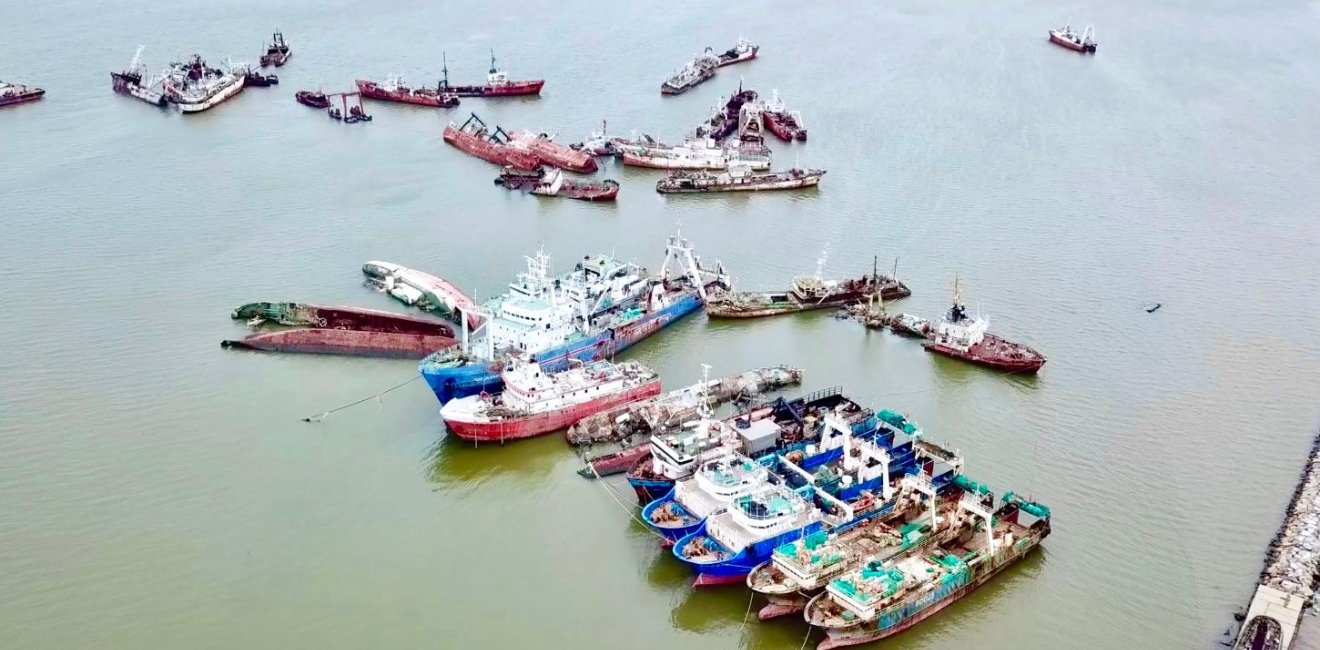
A blog of the Latin America Program
Illegal fishing is one of the top threats to the oceans. One fifth of the world’s wild-caught fish comes from illegal, unreported, and unregulated (IUU) fishing, according to data from the UN Food and Agriculture Organization, a threat to marine biodiversity and coastal fishing communities.
In recent years, environmental advocates have described the Port of Montevideo in Uruguay’s capital as a key link for illegal fishing in South America. In 2017, Oceana, SkyTruth, and Global Fishing Watch issued a joint report that highlighted Montevideo’s role as a major transshipment point for IUU fishing, mostly linked to China.
Risky Business
Like Rome, the Port of Montevideo’s bad reputation wasn’t built in a day. It was years in the making.
In 2003, the longest, riskiest, and most spectacular hot pursuit of an alleged illegal fishing vessel was tied to Uruguay, raising concerns over the commitment of the local authorities to police the port.
Uruguayan-flagged longliner Viarsa I, a fishing vessel using kilometric lines with thousands of hooks, was found operating inside the exclusive economic zone of Heard Island, under Australia’s administration. It had aboard a haul of Patagonian toothfish, a protected species, worth millions of dollars. When ordered to stop, the captain fled. From the Southern Indian Ocean to the South Atlantic, the Viarsa I navigated 4,000 miles under rough seas, avoiding icebergs and colliding against 50-foot waves. Australia, South Africa, and the United Kingdon gave chase, and after 20 days located and captured the runaway vessel.
While Uruguayan-flagged vessels had previously been caught fishing illegally in distant waters, the case of the Viarsa I made global headlines. In Uruguay, newspapers referred to these ships as “Uruguay’s pirate flagged fleet.”
The scandal led to the creation of a special congressional committee to review Uruguay’s permitting system, and the government invalidated six high seas fishing licenses over the next two months. Uruguay also stopped serving as a “flag of convenience,” committing only to register ships whose owners were Uruguayan.
Since then, however, little has changed. The Port of Montevideo has reportedly continued to accept vessels carrying illegal catch. This is despite announcements of improved control mechanisms consistent with the global Port States Measures Agreement to Prevent, Deter, and Eliminate Illegal, Unreported, and Unregulated Fishing. Indeed, China’s distant-water fishing fleet has expanded its operations in the Port of Montevideo, including ships involved in massively harvesting squid off the coast of South America. These ships have become notorious for their conduct, including their practice of “going dark,” or switching off automatic identification systems, allegedly to fish illegally in the territorial waters of Latin American countries.
A Step Backwards
Uruguay’s government has said it takes this challenge seriously. “The Port of Montevideo is committed to enforcing laws regulating vessels in this region, and to cracking down on vessels that do not comply,” Jaime Coronel, the national director of aquatic resources in the Ministry of Livestock and Fisheries, has said.
Environmental advocates, however, say Uruguay has a long way to go. In 2019, for example, the government inspected only 10 percent of ships at the Port of Montevideo, and only one flying a Chinese flag. This year, Uruguay’s National Ports Administration changed its online public registry, reducing transparency, and blocked access to historical information on port dockings.
These represents steps backwards in the fight against overfishing, and appear to run counter to the Escazú Agreement on the public’s right to information on environmental issues.
Author

Latin America Program
The Wilson Center’s prestigious Latin America Program provides non-partisan expertise to a broad community of decision makers in the United States and Latin America on critical policy issues facing the Hemisphere. The Program provides insightful and actionable research for policymakers, private sector leaders, journalists, and public intellectuals in the United States and Latin America. To bridge the gap between scholarship and policy action, it fosters new inquiry, sponsors high-level public and private meetings among multiple stakeholders, and explores policy options to improve outcomes for citizens throughout the Americas. Drawing on the Wilson Center’s strength as the nation’s key non-partisan policy forum, the Program serves as a trusted source of analysis and a vital point of contact between the worlds of scholarship and action. Read more

Explore More in Weekly Asado
Browse Weekly Asado
Dengue Haunts South America’s Summers

Lessons from Costa Rica’s Economic Transformation

Women and Latin America’s Digital Revolution


